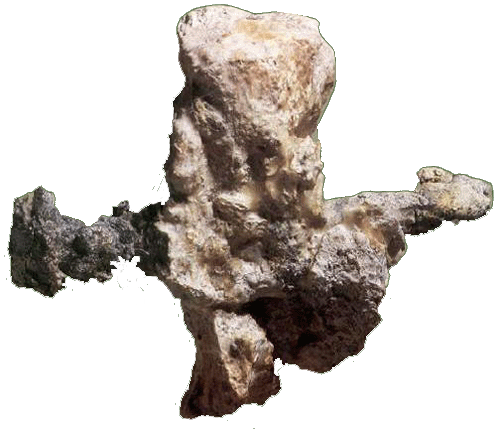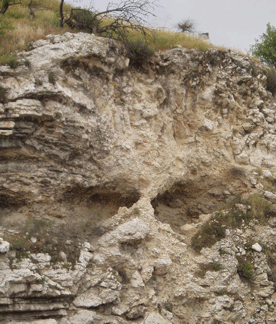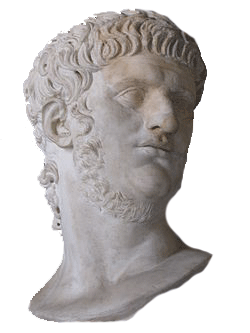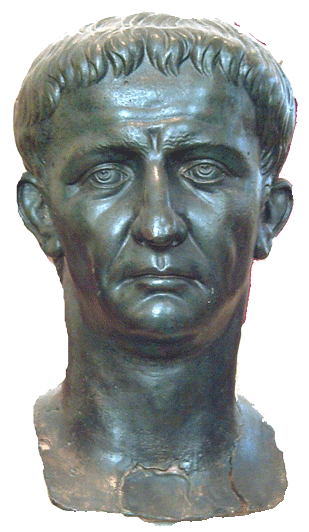History and Jesus

Crucified ankle bone of John son of Ezekiel.
About the first century AD.
Was crucifixion actually practiced as a form of execution?
In 1968, archaeologists found the bones of a crucified man in a burial chamber. It was located north of Jerusalem. His name was John, son of Ezekiel. Numerous individuals were buried there; several died some type of violent death. When buried, the nail in his ankle remained.
The Romans used crucifixion as a method of mass execution. It was intended to inflict pain, a slow death, mutilate the body, and inflict terror on the community. There are numerous contemporary texts that discuss the practice.

Golgotha.
The place of the skull.
Where was Jesus crucified?
Golgotha means the place of the skull. It is a likely site of the crucifixion of Jesus.
Carrying his own cross, he went out to the place of the skull. In Aramaic it is called Golgotha. (John 19:17)
Was Jesus a real person?
Jesus was a real person who lived in the early first century.
Many different sources, other than the scriptures, discuss his life. No contemporary source questions his existence.
Josephus
Josephus was a Jewish historian, politician, and military leader in the first century. He followed the law, but also believed that observant Jews could still participate in Roman life. He wrote two important works, The Antiquities of the Jews, and the The Jewish Wars. In his works, he has sections regarding Jesus, John the Baptist, James the brother of Jesus, and the governor Pontius Pilate.
Jesus
Now there was about this time Jesus, a wise man, if it be lawful to call him a man; for he was a doer of wonderful works, a teacher of such men as receive the truth with pleasure. He drew over to him both many of the Jews and many of the Gentiles. He was the Christ. And when Pilate, at the suggestion of the principal men among us, had condemned him to the cross, those that loved him at the first did not forsake him; for he appeared to them alive again the third day; as the divine prophets had foretold these and ten thousand other wonderful things concerning him. And the tribe of Christians, so named from him, are not extinct at this day. (Antiquities 18:63-64)
John the Baptist
Now some of the Jews thought that the destruction of Herod's army came from God. That was just, as a punishment of what he did against John, that was called the Baptist. Herod murdered him, even though he was a good man. He commanded the Jews to exercise virtue: both as to righteousness towards one another, and piety towards God, and so to come to baptism. Washing would be acceptable to him, if they made use of it. Not only to put away some sins, but for the purification of the body. This supposed that the soul was thoroughly purified beforehand by righteousness. Others came in crowds about him, for they were very greatly moved by hearing his words. Herod feared that the great influence John had over the people might put it into his power and inclination to raise a rebellion. They seemed ready to do any thing he should advise. He thought it best, by putting him to death, to prevent any mischief he might cause. He wanted to avoid difficulties, by sparing a man who might make him repent of it when it would be too late. He was sent as a prisoner, out of Herod's suspicious temper, to Macherus. He was kept in the castle I before mentioned, and was there put to death. Now the Jews had an opinion that the destruction of this army was sent as a punishment upon Herod. It was a mark of God's displeasure to him. (Antiquities 18.5.2)
James the Brother of Jesus
Ananus assembled the sanhedrin of judges. He brought before them the brother of Jesus, who was called Christ, named James, and some others. When he had formed an accusation against them as breakers of the law, he delivered them to be stoned. Some seemed the most equitable of the citizens, and such as were the most uneasy at the breach of the laws. They disliked what was done. They also sent to the king, desiring him to send to Ananus that he should act so no more. What he had already done was not to be justified. Some of them went also to meet Albinus, as he was upon his journey from Alexandria. They informed him that it was not lawful for Ananus to assemble a sanhedrin without his consent. Whereupon Albinus complied with what they said. He wrote in anger to Ananus, and threatened that he would bring him to punishment for what he had done. King Agrippa took the high priesthood from him when he had ruled only three months. He made Jesus, the son of Damneus, high priest. (Antiquities 20.9)

The Roman emperor Nero.
Tacitus
Tacitus was a politician and historian of the Roman empire during the first and second centuries AD. His two works span the lives of the Roman emperors from Tiberius to Domitian. He was from a wealthy family; he knew many other politicians from his era.
Consequently, to get rid of the report, Nero fastened the guilt and inflicted the most exquisite tortures on a class hated for their abominations, called Christians by the populace. Christus, from whom the name had its origin, suffered the extreme penalty during the reign of Tiberius at the hands of one of our procurators, Pontius Pilatus, and a most mischievous superstition, thus checked for the moment, again broke out not only in Judæa, the first source of the evil, but even in Rome, where all things hideous and shameful from every part of the world find their centre and become popular. Accordingly, an arrest was first made of all who pleaded guilty; then, upon their information, an immense multitude was convicted, not so much of the crime of firing the city, as of hatred against mankind. Mockery of every sort was added to their deaths. Covered with the skins of beasts, they were torn by dogs and perished, or were nailed to crosses, or were doomed to the flames and burnt, to serve as a nightly illumination, when daylight had expired. (Annals 15.44)

The Roman emperor Claudius.
Suetonius
Suetonius was a Roman historian of the equestrian order. His greatest work was the biographies of the twelve Caesars from Julius to Domition. He gives personal descriptions of their lives and exploits. He references the expulsion of the Jews on account of Christ.
Since the Jews constantly made disturbances at the instigation of Chrestus, he expelled them from Rome. (Claudius 25.1-5)
This event is also referenced by Luke.
[Paul] met a Jew named Aquila, a native of Pontus. He had recently come from Italy with his wife Priscilla, because Claudius had ordered all the Jews to leave Rome. (Acts 18:2)
Suetonius mentions persecution inflicted on Christians during the reign of Nero.
Punishment was inflicted on the Christians, a class of men given to a new and mischievous superstition. (Nero 16.2)
Pliny the Younger
Pliny was a lawyer, politician, and author. Pliny was active in the Roman legal system. He held many different posts. He held the post of governor of Pontus and Bithynia, which were in Asia minor.
He published his correspondences back and forth with the emperor Trajan. One letter deals with questions about how to deal with the crime of following Christianity. His letter and Trajan's response are included.
It is my invariable rule, sir, to refer to you in all matters where I feel doubtful; for who is more capable of removing my scruples, or informing my ignorance? Having never been present at any trials concerning those who profess Christianity, I am unacquainted not only with the nature of their crimes, or the measure of their punishment, but how far it is proper to enter into an examination concerning them.
Whether, therefore, any difference is usually made with respect to ages, or no distinction is to be observed between the young and the adult; whether repentance entitles them to a pardon; or if a man has been once a Christian, it avails nothing to desist from his error; whether the very profession of Christianity, unattended with any criminal act, or only the crimes themselves inherent in the profession are punishable; on all these points I am in great doubt.
In the meanwhile, the method I have observed towards those who have been brought before me as Christians is this: I asked them whether they were if they admitted it, I repeated the question twice, and threatened them with punishment; if they persisted, I ordered them to be at once punished: for I was persuaded, whatever the nature of their opinions might be, a contumacious and inflexible obstinacy certainly deserved correction. (Pliny to Trajan, Letter 97)
Celsus
Celsus was philosopher during the second century AD. He opposed Christianity. He wrote a comprehensive attack on Christianity. His wrote his work, True Reason, about 177 AD.
The complete work did not survive. We only know about it from its mention and quotes from a Christian author, Origen. It is found in Origen's work, Against Celsus.
Celsus denies that Jesus resurrected from the dead. He claims that the mother of Jesus was a peasant. Celsus states that Jesus was an illegitimate child through a Roman soldier. Celsus believes that Jesus only attracted a few followers. He believes that Jesus taught his disciples to beg for money.
For [Celsus] represents the Jew disputing with Jesus, and confuting Him, as he thinks, on many points; and in the first place, he accuses Him of having invented his birth from a virgin, and upbraids Him with being born in a certain Jewish village, of a poor woman of the country, who gained her subsistence by spinning, and who was turned out of doors by her husband, a carpenter by trade, because she was convicted of adultery; that after being driven away by her husband, and wandering about for a time, she disgracefully gave birth to Jesus, an illegitimate child, who having hired himself out as a servant in Egypt on account of his poverty, and having there acquired some miraculous powers, on which the Egyptians greatly pride themselves, returned to his own country, highly elated on account of them, and by means of these proclaimed himself a God. (Against Celsus I.28)
However, Celsus admits that Jesus existed. He only disputes certain details about his life. The idea that Jesus did not exist was not an argument that critics used.
The Scriptures
The scriptures give many details about the life of Jesus. This includes details about his birth, life, teachings, family, and death. There are numerous independent works in the scriptures that make these claims. This body of information is significant. While someone might dispute some specifics, it seems unlikely that his entire biography could be a fiction.
Jesus performed many other signs in the presence of his disciples, which are not recorded in this book. But these are written that you may believe that Jesus is the Messiah, the Son of God, and that by believing you may have life in his name. (John 20:30-31)
Jesus did many other things as well. If every one of them were written down, I suppose that even the whole world would not have room for the books that would be written. (John 21:25)
Christ died for our sins according to the Scriptures. He was buried, raised on the third day according to the Scriptures. He appeared to Cephas, and then to the Twelve. After that, he appeared to more than five hundred of the brothers and sisters at the same time. Most are still living, though some have fallen asleep. Then he appeared to James, then to all the apostles, and last of all he appeared to me also. (1 Corinthians 15:3-7)
Look at the next section.